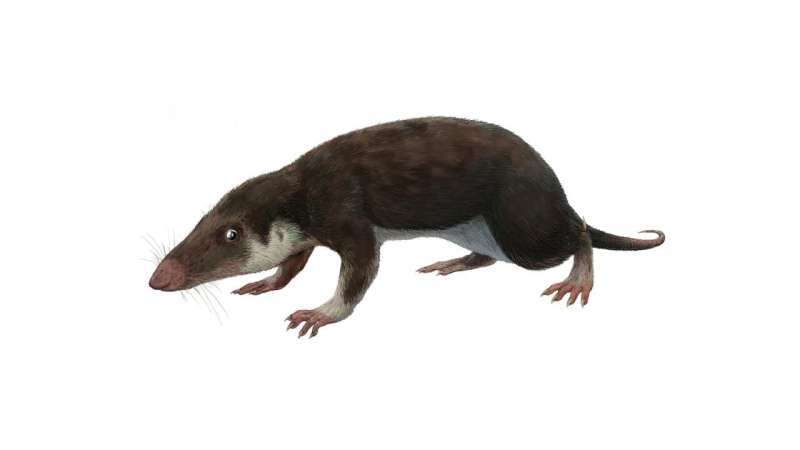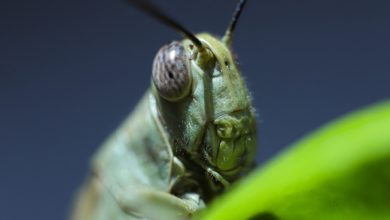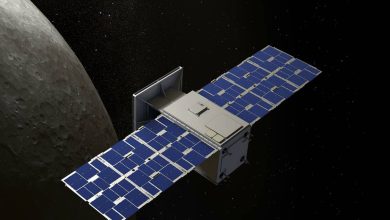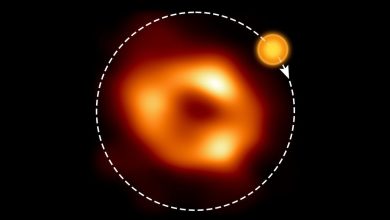
An international team has reconstructed the organization of the genome of the first common ancestor of all mammals. The reconstructed ancestral genome could help to understand the evolution of mammals and the conservation of modern animals. The first mammalian ancestor probably resembled this fossil animal, Morganucodon, which lived about 200 million years ago. Credit: Wikipedia by User Funkmonk, Creative Commons Attribution-Share Alike 3.0 Unported License
Every modern mammal, from the platypus to the blue whale, descends from a common ancestor who lived around 180 million years ago. We do not know much about this animal, but the organization of its genome has been reconstructed by computer by an international team of researchers. The book is published on September 30 in Proceedings of the National Academy of Sciences.
“Our findings have important implications for understanding mammalian evolution and for conservation efforts,” said Harris Lewin, Distinguished Professor of Evolution and Ecology at the University of California, Davis and lead author of the item.
The researchers relied on high-quality genomic sequences from 32 living species representing 23 of the 26 known orders of mammals. They included humans and chimpanzees, wombats and rabbits, manatees, domestic cattle, rhinos, bats and pangolins. The analysis also included chicken and Chinese alligator genomes as comparison groups. Some of these genomes are being produced as part of the Earth BioGenome project and other large-scale biodiversity genome sequencing efforts. Lewin chairs the Earth BioGenome Project Working Group.
The reconstruction shows that the mammalian ancestor had 19 autosomal chromosomes, which control the inheritance of characteristics of an organism apart from those controlled by sex-linked chromosomes (these are paired in most cells, i.e. 38 in total), plus two sex chromosomes, said Joana Damas, first author of the study and postdoctoral researcher at the UC Davis Genome Center. The team identified 1,215 gene blocks that consistently appear on the same chromosome in the same order across all 32 genomes. These building blocks of all mammalian genomes contain genes essential for the development of a normal embryo, Damas said.
Stable chromosomes over 300 million years
The researchers found nine whole chromosomes or chromosome fragments in the mammalian ancestor, whose gene order is the same in the chromosomes of modern birds.
“This remarkable finding shows the evolutionary stability of gene order and orientation on chromosomes over an extended evolutionary time span of more than 320 million years,” Lewin said.
In contrast, the regions between these conserved blocks contained more repetitive sequences and were more prone to sequence breaks, rearrangements and duplications, which are the main drivers of genome evolution.
“Ancestral genome reconstructions are essential for interpreting where and why selective pressures vary across genomes. This study establishes a clear relationship between chromatin architecture, gene regulation, and linkage conservation” , said Professor William Murphy, Texas A&M University, who was not an author on the paper. “This provides the basis for assessing the role of natural selection in the evolution of chromosomes through the mammalian tree of life.”
The researchers were able to track the ancestral chromosomes back in time from the common ancestor. They found that the rate of chromosomal rearrangement differed between mammalian lines. For example, in the ruminant lineage (leading to modern cattle, sheep and deer), there was an acceleration of rearrangement 66 million years ago, when an asteroid impact killed the dinosaurs and caused the rise of mammals.
The findings will help understand the genetics behind the adaptations that allowed mammals to thrive on a changing planet over the past 180 million years, the authors said.
Sequencing puts carnivore chromosomes in context
Joana Damas et al, Evolution of the karyotype of ancestral mammals and syntenic regions, Proceedings of the National Academy of Sciences (2022). DOI: 10.1073/pnas.2209139119
Quote: Researchers reconstruct genome of common ancestor of all mammals (2022, September 27) Retrieved September 29, 2022 from https://phys.org/news/2022-09-reconstruct-genome-common-ancestor-mammals .html
This document is subject to copyright. Except for fair use for purposes of private study or research, no part may be reproduced without written permission. The content is provided for information only.
#Researchers #reconstruct #genome #common #ancestor #mammals






